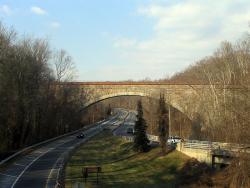
Cabin John Aqueduct, designed by Montgomery C. Meigs, conveys drinking water from Great Falls, Maryland to Washington, D.C. It was the longest stone masonry arch in the world for nearly 40 years. The segmental arch of the bridge has a span of 220 feet and a rise of only 57 feet. The main arch ring is built of cut and dressed granite. The secondary arch ring is radially-laid sandstone, of which the rest of the bridge is also constructed.
Sidewalls made of random ashlar sandstone give the bridge its bold and simple beauty, but they hide the complexity of the structure. Spandrel arches (five along the west end, four along the east) transmit the load of the roadway and the conduit to the main arch. This allows most of the space between the sidewalls to be hollow, thus reducing the dead weight bearings on the arch.
The aqueduct was known as the Union Arch for the first decade after it was completed. Still in use today, it is often referred to as the Washington Aqueduct.



- Captain Montgomery Meigs, Chief Engineer from his fiscal year report, 1861